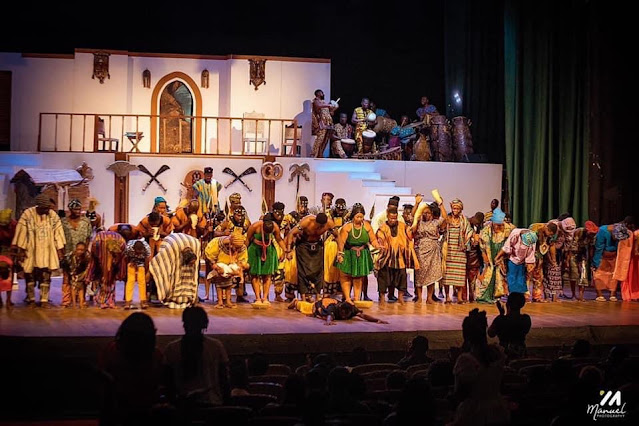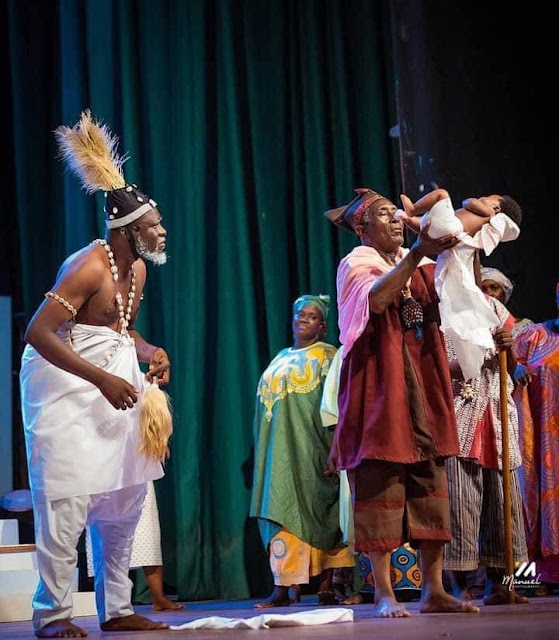The Gods Are Not To Blame is a 1968 play and a 1971 novel by Ola Rotimi. An adaptation of the Greek classic Oedipus Rex, the story centres on Odewale, who is lured into a false sense of security, only to somehow get caught up in a somewhat consanguineous trail of events by the gods of the land.
The novel is set in an indeterminate period of a Yoruba kingdom. This reworking of Oedipus Rex was part of the African Arts (Arts d'Afrique) playwriting contest in 1969. Rotimi's play has been celebrated on two counts: at first scintillating as theatre and later accruing a significant literary aura. This article focuses specifically on the 1968 play.
Ola Rotimi's The Gods Are Not To Blame is the series of unfortunate events that occur in King Odewale's life. Rotimi seals Odewale's fate by having an omen placed over his life at birth. Odewale's horrible fate, whether it had been the Seer being silent, or even his parents not ordering his death.
Odewale storms Kutuje with his chiefs flanking by his side, and is declared King by the town's first chief. The King expresses sympathy to the townspeople for the illness that has been plaguing them. He brings his sick children for the town to see, that way they know that his family is also suffering. Aderopo gives good news to Odewale from Orunmila concerning the sickness going around the kingdom, but along with the good news comes the bad. Odewale learns that there is a curse on the land, and in order for the sickness to stop going around the curse has to be purged. Odewale finds out that the man who is cursed killed King Adetusa I.
The village elders gather round to discuss the allegations that have been made against Odewale. A blind soothsayer, Baba Fakunle, is brought in to share with Odewale the murderer of the old king. Odewale begins to make accusations of a plot being made against him, spearheaded by Aderopo, to one of the village chiefs in response to Baba Fakunle's silence. Aderopo arrives and is immediately confronted by Odewale about his suspicions. Aderopo denies the allegations, and Odewale calls forth the Priest of Ogun. Odewale banishes Aderopo from the kingdom.
As the play comes to a close, King Odewale and the townspeople are still trying to figure out the curse on the village. At this point we are introduced to Alaka, who claims to have known King Odewale since before he came to conquer Kutuje. Odewale confesses that his life spiraled out of control when he killed a man. Later, Ojuola explains that Baba Fakunle made her kill her first born son, convinced that her first son had brought bad luck. Odewale says to the land that the biggest trouble today is not their sickness but instead the plague in their hearts. In the last part Odewale leaves. Odewale brings real facts to the people of the land. Odewale closes the play by stating, ″the gods have lied″ Nathaniel.
Now back to what the Ghanaian actors did to this play at the national theatre on the 2nd and 3rd of December 2023.
The Ghanaian movie industry has being struggling to get recognition for a while now, but the stakeholders in the industry failed to identify where the challenge is. Since the Nigerian movies have taken over movies from Africa, Ghana has been looking for means to get back on her feet in the industry.
It was rumored ( I prefer to use this word because I do not have evidence) that African movies actually started making waves from Ghana before the Nigerians took over, just like the controversies surrounding the afro beats and highlife in the music industry.
But I as an individual has always argued that movie is not a Ghanaian thing but rather Theatre.
Why do I say so? Take some time off your busy schedules and watch about five Ghanaian movies and then make few notes on your observations. Now scout for theatre productions around the country like the Roverman Productions, Latif Abubakar plays and so on and then make it a point to attend at least five of those theatre productions, make notes on your observations and compare.
You will realize that, Ghanaians are better in theatre than in movies more so, if dedicated work and resources are channelled into the theatre industry, as well as innovative ways of making the theatre productions available to people all over the world; I promise you, Ghana will cash out big in the "acting industry" (so i decide to call it).
And now this is what the Ghanaian actors led by George Quaye a popular actor also known as Aboagye, a name he got from a household TV series titled Taxi Driver did.
This gentle man since day one is very passionate about the entertainment industry. He is deeply into the movie and theatre industry. From my observation, the young man knows the value of theatre productions and what can make waves in the industry. I'm not surprised he studied theatre arts in the University.
George first of all partnered with prominent actors; the likes of David Dontor and Naa Ashorkor to bring this production to life. He took his time to study the Nigerian culture and portrayed that in his stagecraft with so much professionalism that a mere viewer would never know that the play was staged by Ghanaians and zero Nigerian actors.
My observations:
- He was able to get a good dance ensemble to replicate the authentic Nigerian Yoruba Music.
- The stage props was just on point.
- Costume was fully authentic Nigerian Yoruba.
- And oh did you see how that sword was made to blaze with fire?
In Conclusion, Ghanaians must move away from movies and focus on theatre, so we could create one of our own and give room to more script writers to challenge themselves. Not forgetting that theatre pays instantly and it's very lucrative.
As much as I love the work by George, I will also suggest that more of Ghanaian stories be staged than that of other countries. Because this is the only way we can create something Ghanaian that people will look for and patronize and also for us to be noted for.
I hope the Ghanaian "acting Industry" have now seen the light and we shall all follow the trend.
by: Dat Keta boy
See excerpts below:
















Post a Comment